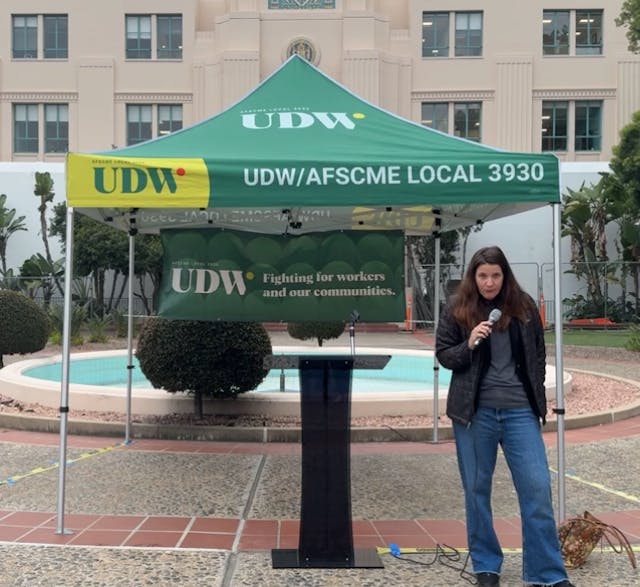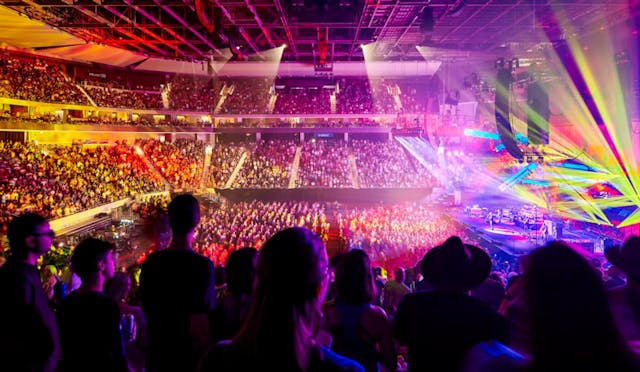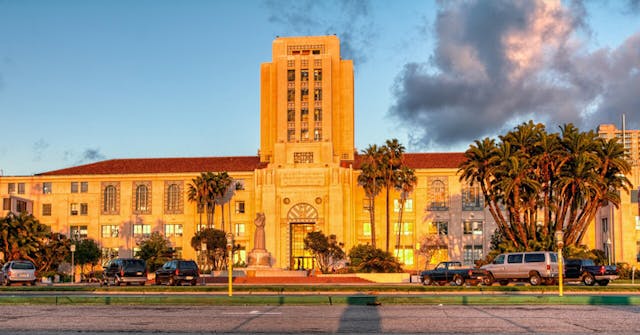The Resurrection of Producer Dennis Leoni
 First Person:
First Person:
By Al Carlos Hernandez
Writer, director, producer Dennis Leoni broke mainstream media ground several years ago as the creative force behind the Showtime TV Series Resurrection Blvd. He spent five years of his life working 24-7 to give birth to three seasons. Fifty-three episodes and he is ready to jump back into the mix with new projects on the drawing board once more.
Leoni has learned that the process towards productivity can be arduous. Perseverance and staying true to your convictions in the end are what really matter.
Dennis remembers, “Having been born and raised in Tucson, Arizona, I attend the University of Arizona. After my sophomore year, I left to become an actor/stuntman at Old Tucson Studios. A couple of years later I moved to Hawaii and worked my way from in front of the camera to behind the camera, eventually working as an assistant director on the CBS series HAWAII FIVE-O.”
Once Leoni had written his first screenplay, he moved to Los Angeles. “Along the way there have been many supporters, mostly my friends, and, of course, a few naysayers. But I had a vision of what was possible and so I didn’t let them deter me. Several spec scripts and a couple of odd writing jobs later, I was hired to write a six half-hour series for HBO/Cinemax.
“Ike Jones is the person who gave me my first job. Gil Grant is the one who gave me my first big opportunity to learn the ins and outs of a television series. I worked on three consecutive series with Gil Grant: HULL HIGH for NBC, and COVINGTON CROSS and MCKENNA for ABC.
“I should also mention that my wife Debbie was the head of drama development at ABC during this time, which provided numerous contacts and an invaluable insight into the television business.”
With more scripts and a world of experience under his belt, “I sold Resurrection Blvd. to Showtime, on which I spent the next five years doing three seasons from 2000 until 2002.”
Resurrection Blvd. was ground breaking for Latinos in many ways. It helped Showtime make serious inroads into encouraging Latinos to purchase Showtime as part of their cable package.
“First off, let me say that Resurrection Blvd. – other than my familial experiences – has been the greatest experience of my life. It put me on the map, so to speak, and shoved me out into the spotlight giving me access to people, places and things that most people only dream about. It is also the flagship of my creative legacy.
“However, there is a stigma that has branded me and others who have worked on the show. I worked for almost twenty years in television series before I created Resurrection Blvd. but now it seems most of the industry thinks that all I can do are Latino projects.”
Why do they have that opinion?
“Like I said before, I had not had a Latino character produced until I made Resurrection Blvd. That’s the bad part. Another negative is that the entertainment business has a bias against shows like Resurrection Blvd. They feel that only Latinos will be interested in such a program.
“The truth, according to Showtime’s polls, is that fifty-five percent of RB’s viewers were white or Anglo or European-American, which is what I call them. Thirty percent were African-American and only fifteen percent were Latino. One thing that I didn’t like, and something I consider to be a large part of the problem, is that RB was not marketed in a mainstream way. From the onset, Showtime and the media would not let go of the idea that RB was about a Latino family, when I believe they should have focused on the fact that this was just another family struggling for a piece of the American dream…and who just happened to be Latino.”
Leoni has not been resting on his laurels since RB, but rather flying under the radar.
“Since RB I’ve been hired to write several pilots in the hope of launching another series. With the television business changing, and not necessarily for the better, I have shifted my focus to feature films and have partnered with David Valdes in an effort to write, produce and direct my own films.
“It was my wife Debbie who first came up with the idea that I should write in my own voice, obviously a Latino one. Being at ABC, she saw that there were very few Latinos who were being given a chance or who had the experience or were capable enough to create any series, much less a Latino one. While my first screenplay was a period piece about a Mexican boy, I had never had a Latino character produced. It seemed like it was high time to change that fact, so it was a conscious decision on my part to make my Latino heritage at least part of my professional portfolio.”
The conspicuous absence of Latino/American themed TV shows on mainstream media begs the question: Why?
Dennis strongly contends that “Latinos must pay more attention. I can’t tell you how many Latinos I’ve met who have never heard of RB and, worse, those who have and have never bothered to see what it’s all about. So here is my mantra: CREATE MARKETPLACE. If we Latinos ever expect anything to change, we must create our own marketplace. If we don’t buy our own goods, how can we expect anyone else to? If you want the “powers that be” in the entertainment business to keep on ignoring us, then keep on supporting and going to see all of the mainstream crap they continually shove down our throats.
“If you want to change that, then make an effort to support Latino projects. Then and only then will movie executives pay attention to who we are. I’m not saying that every Latino has to like Resurrection Blvd. and go out and buy the DVD and the soundtrack, although they should.
“What I am saying is that Latinos have to make an effort to discover what’s out there being created for and about them and support it so there will be more.”
Why does this always seem to happen?
Leoni said, “Sometimes I think we don’t do this because of the historical and current pejorative connotations associated with being a Latino, i.e. being an illegal immigrant or a day laborer or just plain poor. Are we so busy assimilating and denying who we are that we can’t stand up and fight for what’s best for us culturally, politically, socially, economically and financially? Take a lesson: the African-Americans have done it. We can too.”
If and since this is true, does Leoni believe that his work is viewed subjectively because of his ethnic enhanced perspective?
“There’s no question my work would be viewed more objectively if I were not a Latino writer/producer/director. It’s very easy to be pigeon-holed in Hollywood. Being Latino just happens to be the latest trap.”
Leoni wears many hats but which is his favorite?
“Writing is my passion because, first and foremost, that is what I am – a writer. Producing is the obvious next step because all writers want to see their work made. Directing is more of a defense mechanism because at this point in my career I want to protect the vision of my work.”
What are you working on now?
“Right now I’m working on several projects, too numerous to mention, really. PISTOLERO, of course, is at the forefront. I keep saying I’m getting away from television but there are a couple of other projects that I’m interested in. One is a book that was sent to me called THE DARK SIDE OF THE DREAM, which is a story about a family that migrates north from Mexico just before WWII and produces a war hero who is awarded the Congressional Medal of Honor. There are many other elements to the story, including a side of the family that becomes involved in the struggle of the migrant farm workers. The combination of this dynamic of immigrants who fight and die for a country that refuses to treat them with respect and in a humane manner is fascinating to me. It’s at the heart of something I think most Latinos who were born on this side of the border struggle with.”
Why are those projects difficult to get made in this economic climate?
“Genre pieces with Latino leads are not being told. We have a lot of great historical and biographical pieces that need to be told, but we need to see horror pictures, westerns, mysteries, action-adventure, romantic comedies, etc. with Latino leads. We can and should be the primary characters in all kinds of situations. I’m primary in my home, just like every Latino is primary in their home. Why can’t we see ourselves that way in the movies? I’ll tell you why: because the European-American executives who decide on which movies get made don’t see us that way. We’re secondary to them in their homes.It’s not necessarily an overtly racist or malicious thing, though it can be, but Latinos are the maids, the nannies and the gardeners in their homes. It’s that simple. That’s their experience of who we are.”
What are some of your favorite genres?
“Westerns are my favorite. I grew up watching everything from The Rifleman to The Lone Ranger to Bonanza to Zorro with my grandma Paula. She gave me my love of westerns. That’s why I’m making a western, and I think the best platform for this is a mainstream feature film that will be marketed to everyone. Both Latinos and non-Latinos will see a realistic portrayal of who we are and who we can be.”
How has the downturn in the economy effected the production of entertainment properties?
“The downturn in the economy has created all sorts of problems. There’s less money to make movies and movie-goers have less money to spend at the box office. Ad revenues are down in television, making it more difficult to make expensive dramas, which is why we have to suffer all those ridiculous reality shows. And it’s difficult for everyone. I know many people – actors, writers, directors, producers, executives, agents – who have either taken other jobs to supplement their income or merely left the business to pursue entirely different careers. I remember early in my career when I first moved to L.A. that there was a strike and I had to go work in a 7-Eleven. Who knows, maybe they’ll give me my old job back if I need it.”
What are your overall hopes and dreams for the future?
“I just want to be treated equally and with respect, whether it’s in business or life in general. My hope and vision is simple: that someday we won’t have to even discuss much of this prejudicial nonsense because the playing field will be level and everyone will achieve or fail according to their merits. We don’t necessarily have to like each other or even get along, but it’s essential that we compete as equals. It’s a long shot, but it could happen.”
It could and should happen indeed.



 Arturo Castañares
Arturo Castañares


